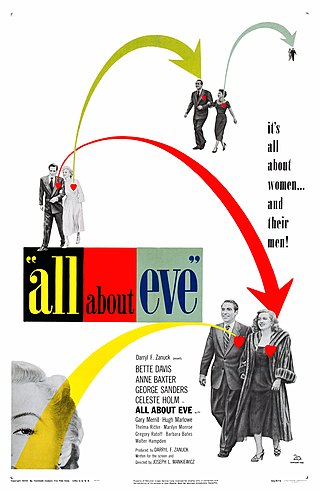
All About Eve is a 1950 American drama film written and directed by Joseph L. Mankiewicz, and produced by Darryl F. Zanuck. It is based on the 1946 short story "The Wisdom of Eve" by Mary Orr, although Orr does not receive a screen credit.

Dark Victory is a 1939 American melodrama film directed by Edmund Goulding, starring Bette Davis, and featuring George Brent, Humphrey Bogart, Geraldine Fitzgerald, Ronald Reagan, Henry Travers, and Cora Witherspoon. The screenplay by Casey Robinson was based on the 1934 play of the same title by George Brewer and Bertram Bloch, starring Tallulah Bankhead.

Ruth Elizabeth "Bette" Davis was an American actress of film, television, and theater. Regarded as one of the greatest actresses in Hollywood history, she was noted for her willingness to play unsympathetic, sardonic characters and was known for her performances in a range of film genres, from contemporary crime melodramas to historical and period films and occasional comedies, although her greatest successes were her roles in romantic dramas. She won the Academy Award for Best Actress twice, was the first person to accrue ten Academy Award nominations for acting, and was the first woman to receive a Lifetime Achievement Award from the American Film Institute. In 1999, Davis was placed second on the American Film Institute's list of the greatest female stars of classic Hollywood cinema.

Watch on the Rhine is a 1943 American drama film directed by Herman Shumlin and starring Bette Davis and Paul Lukas. The screenplay by Dashiell Hammett is based on the 1941 play Watch on the Rhine by Lillian Hellman. Watch on the Rhine was nominated for the Academy Award for Best Picture and Paul Lukas won the Academy Award for Best Actor for his performance as Kurt Muller, a German-born anti-fascist in this film.

Dangerous is a 1935 American drama film directed by Alfred E. Green and starring Bette Davis in her first Oscar-winning role. The screenplay by Laird Doyle is based on his story Hard Luck Dame.

Now, Voyager is a 1942 American drama film starring Bette Davis, Paul Henreid, and Claude Rains, and directed by Irving Rapper. The screenplay by Casey Robinson is based on the 1941 novel of the same name by Olive Higgins Prouty.
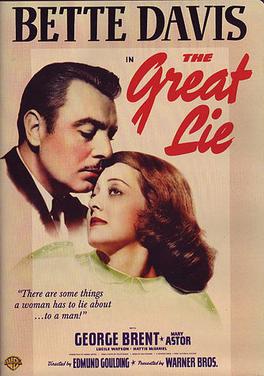
The Great Lie is a 1941 American drama film directed by Edmund Goulding, and starring Bette Davis, George Brent and Mary Astor. The screenplay by Lenore J. Coffee is based on the novel January Heights by Polan Banks.

A Stolen Life is a 1946 American drama film starring Bette Davis, who also produced it. The film, based on the 1935 novel A Stolen Life by Karel Josef Benes, was directed by Curtis Bernhardt. Among the supporting cast are Glenn Ford, Dane Clark, Peggy Knudsen, Charlie Ruggles, and Bruce Bennett. It is a remake of the 1939 British film Stolen Life starring Elisabeth Bergner and Michael Redgrave.

Another Man's Poison is a 1951 British drama film directed by Irving Rapper and starring Bette Davis, Gary Merrill and Emlyn Williams. The screenplay by Val Guest is based on the play Deadlock by Leslie Sands.
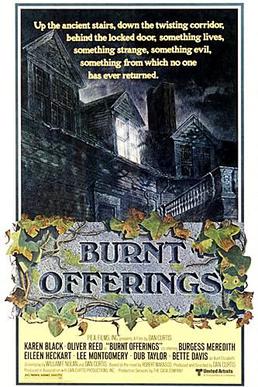
Burnt Offerings is a 1976 American supernatural horror film co-written and directed by Dan Curtis and starring Karen Black, Oliver Reed, Bette Davis, and Lee H. Montgomery, with Eileen Heckart, Burgess Meredith and Anthony James in supporting roles. It is based on the 1973 novel of the same name by Robert Marasco. The plot follows a family who begins to interpersonally dissolve under supernatural forces in a large estate they have rented for the summer.

The Watcher in the Woods is a 1980 American supernatural horror film directed by John Hough and Vincent McEveety and starring Bette Davis, Carroll Baker, Lynn-Holly Johnson, Kyle Richards, and David McCallum. Based on the 1976 novel by Florence Engel Randall, the film tells the story of a teenage girl and her little sister who become encompassed in a supernatural mystery regarding a missing girl in the woods surrounding their new home in the English countryside.

Where Love Has Gone is a 1964 American Technicolor drama film in Techniscope made by Embassy Pictures, Joseph E. Levine Productions and Paramount Pictures. It was directed by Edward Dmytryk and produced by Joseph E. Levine from a screenplay by John Michael Hayes based on the 1962 novel of the same name by Harold Robbins. The music score was by Walter Scharf, the cinematography by Joseph MacDonald and the costume design by Edith Head.

The Anniversary is a 1968 British black comedy film directed by Roy Ward Baker for Hammer Films and Seven Arts and starring Bette Davis. The screenplay, by Jimmy Sangster, was adapted from Bill MacIlwraith's 1966 play.

Two's Company is a musical revue with principal sketches by Charles Sherman and Peter DeVries, principal lyrics by Ogden Nash and Sammy Cahn, and principal music by Vernon Duke.
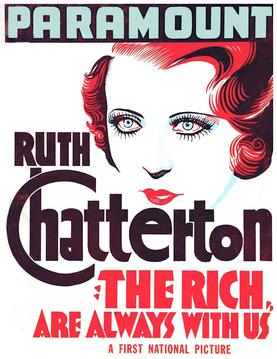
The Rich Are Always with Us is a 1932 American pre-Code romantic comedy-drama film directed by Alfred E. Green and starring Ruth Chatterton, George Brent, and Bette Davis. The screenplay by Austin Parker is based on the novel of the same name by Ethel Pettit.

It's Love I'm After is a 1937 American screwball comedy film directed by Archie Mayo and starring Leslie Howard, Bette Davis, and Olivia de Havilland. Based on the story "Gentlemen After Midnight" by Maurice Hanline, with a screenplay by Casey Robinson, the film is about a couple who have postponed their marriage eleven times and who continue to plot and scheme their way to marriage. The film marked the third on-screen pairing of Leslie Howard and Bette Davis, following Of Human Bondage and The Petrified Forest.

Ex-Lady is a 1933 American pre-Code comedy/drama film directed by Robert Florey. The screenplay by David Boehm is a remake of the Barbara Stanwyck film Illicit (1931), both crediting a story by Edith Fitzgerald and Robert Riskin. The film focuses on a pair of lovers, commercial illustrator Helen Bauer and advertising writer Don Peterson, who have been living together quite happily for some time. One night, after hiding in Helen's bedroom until their party guests have all left, Don announces that he is tired of sneaking around. He wants marriage—and possibly children—and Helen finally agrees, although she is afraid that it will wreck their relationship. Her predictions of trouble—increased by the stresses of opening their own advertising agency—come true, but in the end, with the serendipitous intervention of their perpetually inebriated friend, Van, they reconcile and resume the mixed blessings of wedded bliss.
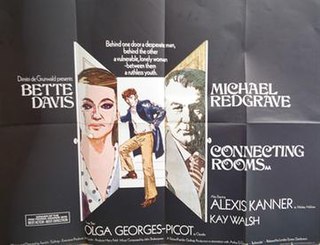
Connecting Rooms is a 1970 British drama film written and directed by Franklin Gollings. The screenplay is based on the play The Cellist by Marion Hart. The film stars Bette Davis, Michael Redgrave, and Leo Genn.

Scream, Pretty Peggy is a 1973 American made-for-television horror film directed by Gordon Hessler and starring Bette Davis, Ted Bessell, and Sian Barbara Allen. Its plot follows a young college student who is given a job by a sculptor housekeeping at a mysterious mansion where his sister and their elderly mother reside. It was broadcast as the ABC Suspense Movie on November 24, 1973.
John Gay was an American screenwriter, born in Whittier, California.



















